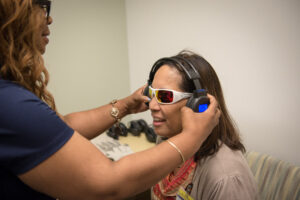Are you concerned about keeping your memory sharp as you age? Whether you’re seeking to support your own cognitive health or that of a loved one, maintaining a sharp memory is vital for overall well-being. At CountryHouse, we understand the importance of preserving memory, especially for individuals living with dementia. If you’re in search of trustworthy Iowa dementia care services, look no further.
Continue reading to learn more about how you can keep memory sharp as you age as well get important information regarding our community:
#1.) Nourish Your Brain with a Healthy Diet
Your brain thrives on a balanced diet rich in nutrients. Consider incorporating the following brain-boosting foods into your meals:
Leafy Greens:
Spinach, kale, and other leafy greens are packed with vitamins and antioxidants that support brain health.
Berries:
Blueberries, strawberries, and raspberries are loaded with antioxidants that protect brain cells from damage.
Nuts and Seeds:
Almonds, walnuts, and sunflower seeds are excellent sources of vitamin E, an antioxidant that may help reduce cognitive decline.
As a part of our Iowa dementia care services, we are proud to prioritize nutrition. That is why we serve our residents delicious, home-style meals complete with a wide variety of foods, including fruits and vegetables, to help bolster their cognitive health.
#2.) Stay Active with Routine Exercise
Regular physical activity not only benefits your body but also your brain. Safe and effective exercises for older adults, including those living with cognitive decline, include:
Chair Yoga:
Gentle yoga poses performed while seated or using a chair for support can improve flexibility, balance, and mental focus.
Resistance Training:
Using resistance bands or light weights can help maintain muscle mass and improve overall strength, which is important for mobility and independence.
Dancing:
Whether it’s ballroom dancing, line dancing, or simply dancing around the living room, moving to music can lift your mood and stimulate cognitive function.
#3.) Engage in Cognitive Activities and Hobbies
Keep your mind sharp by challenging it with stimulating activities and hobbies. As a part of our comprehensive Iowa dementia care services, we are proud to offer a multitude of life enrichment activities. Below are just a few of the great activities we offer to our residents:
Crossword Puzzle:
Solving crossword puzzles can improve verbal fluency, vocabulary, and problem-solving skills.
Memory Games:
Play memory games like Sudoku, chess, or card matching to enhance memory and concentration.
Language Learning:
Learning a new language can strengthen cognitive abilities, improve memory retention, and delay age-related cognitive decline.
#4.) Stay Socially Active
Social interaction is essential for maintaining cognitive health and emotional well-being. At CountryHouse, we strongly encourage our residents to engage in social activities and hobbies to foster connections and make new friends. Here are some tips for staying socially active:
Join a Club or Group:
Whether it’s a book club, gardening group, or volunteer organization, joining a club or group with shared interests can provide opportunities for socialization and connection.
Attend Social Events:
Participate in community events, cultural outings, or social gatherings with friends and family to stay engaged and connected.

#5.) Prioritize Quality Sleep
Adequate sleep is crucial for memory consolidation and cognitive function. As an older adult, you can improve your sleep quality with the following tips:
Create a Relaxing Bedtime Routine:
Establish a calming bedtime routine, such as reading a book, practicing relaxation techniques like deep breathing or meditation, or taking a warm bath.
Limit Screen Time Before Bed:
Reduce exposure to screens, such as smartphones, tablets, and computers, in the hour leading up to bedtime, as the blue light emitted by these devices can interfere with sleep.
Maintain a Comfortable Sleep Environment:
Keep your bedroom cool, dark, and quiet, and invest in a comfortable mattress and pillows to promote restful sleep.
#6.) Challenge Your Brain Regularly
Engaging in mentally stimulating activities on a regular basis can help keep your brain sharp and agile. Try incorporating the following brain challenges into your routine:
Learn a New Skill:
Whether it’s playing a musical instrument, mastering a new hobby, or taking up a new sport, learning something new can stimulate the brain and create new neural pathways.
Do Brain Teasers:
Solve puzzles, riddles, or brain teasers to exercise your cognitive abilities and improve problem-solving skills.
Read Regularly:
Reading books, newspapers, or magazines can expand your vocabulary, improve comprehension, and enhance cognitive function.
#7.) Manage Stress Levels
Chronic stress can negatively impact brain health and cognitive function. Practice stress management techniques such as:
Mindfulness Meditation:
Practice mindfulness meditation to reduce stress, improve focus, and enhance overall well-being.
Deep Breathing Exercises:
Incorporate deep breathing exercises into your daily routine to promote relaxation and reduce stress levels.
Engage in Relaxing Activities:
Take time to unwind and relax with activities you enjoy, such as listening to music, spending time in nature, or practicing yoga or tai chi.
#8.) Stay Hydrated
Dehydration can impair cognitive function and affect memory and concentration. Make sure to drink plenty of water throughout the day to stay hydrated and support optimal brain function.
#9.) Maintain a Positive Outlook
A positive attitude and outlook on life can have a profound impact on cognitive health and overall well-being. Cultivate positivity by:
Practicing Gratitude:
Take time each day to reflect on things you’re grateful for and appreciate the positive aspects of life.
Surrounding Yourself with Positive People:
Spend time with friends and family who uplift and support you, and engage in activities that bring you joy and fulfillment.
Embracing Challenges:
View challenges as opportunities for growth and learning, and approach them with resilience and optimism.
Contact the Best Iowa Dementia Care Services
At CountryHouse, we specialize in providing loving, supportive care for those living with memory loss due to Alzheimer’s disease or related dementias. With a focus on safety, security, and compassionate support, our community offers a warm and inviting environment where residents can thrive and feel at home.
Contact us today to learn more about our Iowa dementia care services and how we can support you or your loved one on the journey to maintaining a sharp memory and enjoying a fulfilling life.




